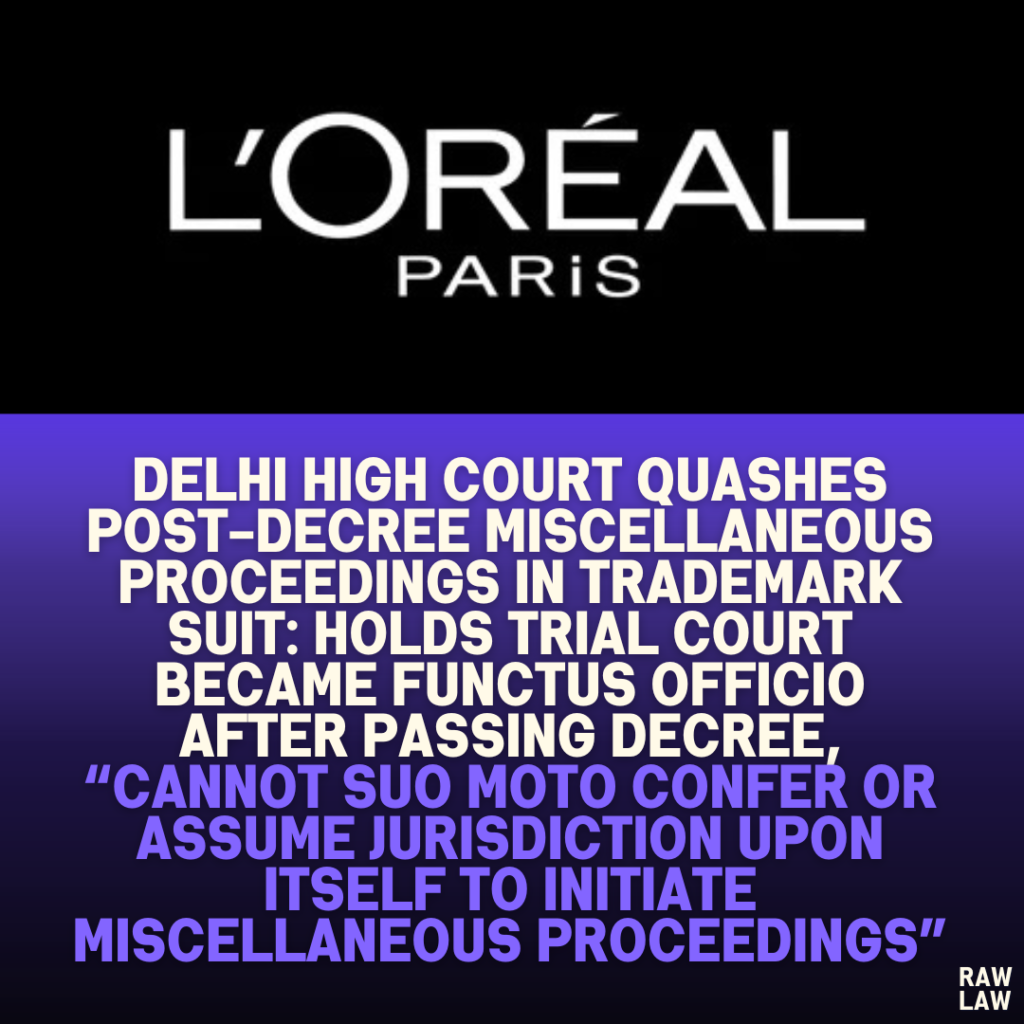Court’s Decision
The Delhi High Court set aside the order dated 17.01.2025 passed by the Trial Court in MISC DJ/3620/2024 and quashed the entire proceedings initiated in that file. It held that once a decree was passed on 19.10.2024 in CS(COMM) 130/2023, the Trial Court became functus officio and could not have assumed jurisdiction to initiate further miscellaneous proceedings. The Court emphasized, “Jurisdiction is conferred not assumed,” and observed that any order passed without jurisdiction is a nullity. Accordingly, the petition under Article 227 of the Constitution was allowed.
Facts
The respondent had filed a commercial suit for permanent injunction and ancillary reliefs against the defendants including the Customs authorities, seeking, inter alia, restraint on import and release of counterfeit goods under the trademark L’OREAL (with or without PARIS). The suit was decreed by the Trial Court on 19.10.2024. On the same day, the Trial Court also initiated a separate miscellaneous proceeding (MISC DJ/3620/2024), issuing directions to call for an Action Taken Report (ATR) and continued to issue further orders including the impugned order dated 17.01.2025.
Issues
- Whether the Trial Court was competent to initiate and continue miscellaneous proceedings after passing a final decree in the main suit?
- Whether the order dated 17.01.2025 issued in MISC DJ/3620/2024 was without jurisdiction and liable to be quashed under Article 227 of the Constitution?
Petitioner’s Arguments
- Once the judgment and decree was passed on 19.10.2024, the Trial Court became functus officio and could not assume jurisdiction to initiate fresh proceedings in the same matter.
- The Trial Court lacked jurisdiction to direct the filing of an ATR or call for comments from panel counsel post-decree.
- Cited judgments:
- Harshad Chiman Lal Modi v. DLF Universal Ltd., (2005) 7 SCC 791
- Dr. Jagmittar Sain Bhagat v. Director, Health Services, (2013) 10 SCC 136
Respondent’s Arguments
None. The respondent did not appear in the proceedings before the High Court.
Analysis of the Law
The High Court underscored the difference between jurisdiction over subject matter and other forms of jurisdiction such as territorial or pecuniary. While the latter can be waived, the former is fundamental and cannot be conferred by consent or participation. A court without subject matter jurisdiction cannot take any action post-decree, and any such action is null and void.
Precedent Analysis
- Harshad Chiman Lal Modi v. DLF Universal Ltd. — The Supreme Court held that subject matter jurisdiction cannot be conferred by consent or acquiescence. Any decree passed without such jurisdiction is a nullity and unenforceable.
- Dr. Jagmittar Sain Bhagat v. Director, Health Services — The Court reaffirmed that jurisdiction must be conferred by statute and cannot be usurped even with the parties’ agreement.
Court’s Reasoning
The Delhi High Court found that the Trial Court had explicitly recorded in its 19.10.2024 judgment that the suit was decreed and the file consigned to the record room. Therefore, it had no authority to initiate further proceedings. The subsequent orders dated 24.10.2024, 11.11.2024, and 17.01.2025 in the miscellaneous case were held to be non-est. The Court reiterated that “[a] court which does not statutorily, or otherwise, have jurisdiction … cannot suo moto confer/ assume jurisdiction upon itself.”
Conclusion
The High Court allowed the petition under Article 227, set aside the impugned order dated 17.01.2025, and quashed the entire MISC DJ/3620/2024 proceedings.
Implications
This judgment reinforces the doctrine of functus officio and affirms that trial courts cannot act beyond their jurisdiction after disposing of a case. It also emphasizes the role of High Courts under Article 227 to correct patently illegal judicial actions, even if procedural participation has occurred.



